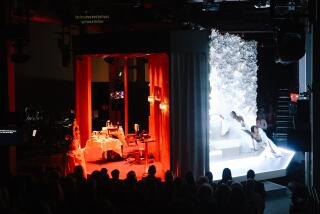Opera couples debate dual role as lover and colleague
The merits of working with one’s spouse can be debated endlessly, but few couples face the pressures of opera singers who share a life and sometimes a stage. In 2004, local music lovers were transfixed when two of opera’s biggest stars, tenor Roberto Alagna and soprano Angela Gheorghiu, appeared in Herbert Ross’ production of Puccini’s “La Bohème” at Los Angeles Opera. That the singers were married to each other in real life made the experience, already rife with romantic pathos, that much more intense.
L.A. Opera is reviving that production from May 12 to June 2, with another married tenor and soprano — the Americans Stephen Costello and Ailyn Pérez — assuming the lead roles of Rodolfo and Mimi. In terms of fame, Costello, 30, and Pérez, 31, are no Alagna and Gheorghiu, who were marketed as “opera’s love couple” for a while. But the younger singers, who wed in 2008 and separately won the Richard Tucker Award, are rising talents.
The placing of married couples in such roles — or others like them — is not especially unusual, though it seems to be more common in America than in Europe. But the occasion provides a natural segue for questions relating to the impact of such choices on artists and audiences alike.
“I think everything is more heightened when you’re singing with your spouse — no matter what the role is,” Pérez said during a joint interview with her husband, between rehearsals at the Music Center this month. “Normally, you’re using your imagination to get into character in a love scene. But when you’re with your husband, it hits you in a way you don’t have to imagine. It becomes more realistic.”
Costello suggests other advantages as well. “Because she sees me wake up in the morning — bad breath, bad hair and all — we have a comfort level with each other that we don’t have with other people,” he said. “So you feel you can explore other options artistically. When you’re singing with your spouse, you’re not worried about offending anyone.”
But the Russian soprano Anna Netrebko — whose appearances in productions of Gounod’s “Roméo et Juliette” and Massenet’s “Manon” opposite tenor Rolando Villazón were L.A. Opera benchmarks — views the situation differently. Though not married, she has been living with the Uruguayan bass-baritone Erwin Schrott, the father of her son.
“No, on the stage we are colleagues, nothing else,” she said a few weeks ago, sitting in the press lounge at the Metropolitan Opera, where she was singing “Manon.” “We have nothing to do with the couple thing. Erwin is an extremely talented performer, and for me it’s cool to work with such a talented person.”
Though she and Schrott have not performed together in a complete opera since their romance was kindled during a run of “Don Giovanni” at London’s Covent Garden in 2007, they started singing joint recitals as a couple last year. And he will join her in January for the Met’s new production of Donizetti’s “Elixir of Love,” to be followed by a new staging of “Faust” in Europe.
“It’s very complicated having a child and two international careers,” Netrebko said. “We’re trying to make it. We don’t want to forget about the art or the real interesting projects, but we would never put our careers in front of the family, because that’s the most important thing. So, yes, it’s hard, but so far it works.”
Netrebko maintains that part of their success as a couple comes from separating their professional and domestic lives. “We’re not talking about music or singing when we’re at home,” she said. “Once the work is done, it’s done. When we’re home, we’re cooking, watching movies, enjoying life. Music does not occupy the primary place in our house. I know couples who talk only about music at home. Maybe they like it. Maybe it’s fun. But not for me.”
Naturally the separations intrinsic to these couples are difficult. Tenor Charles Castronovo, a native New Yorker who keeps a home in Southern California and was last seen at L.A. Opera as the title character in “Il Postino” in 2010, has been married since 2005 to the Russian soprano Ekaterina Siurina.
“I didn’t realize all the problems there would be later,” he said by phone from Berlin, where the couple and their 5-year-old son live when in Europe. “These careers are intense, and there are problems for families. People say we must understand each other very well because we’re in the same profession, but while I’m OK by myself most of the time, my wife isn’t like that. It’s always been harder for her.”
Logistics alone prevent most of these couples from singing together too frequently. One or two runs per season seems the average — though before this year is out, Castronovo and Siurina will perform together in three productions and one concert, taking them to Madrid, Copenhagen, Paris and New York.
Yet working together isn’t always a paradise. “The cons are dealing with stuff in the workplace that you try not to bring home,” said Costello, who calculates that he and Pérez work together about 40% of the time. “If you’re both having unpleasantness in the same production, then you go home that way. Whereas if you’re each doing something different, there’s less chance of that. There’s double stress when you’re working together.”
These pros and cons are a balancing act for partners soprano Patricia Racette, who sang the lead in Britten’s “Turn of the Screw” at L.A. Opera last season, and mezzo-soprano Beth Clayton, who have been together since the late 1990s. Though they met while performing Verdi’s “La Traviata” in Santa Fe, N.M., they have subsequently worked together infrequently.
“It’s a casualty of our repertoires,” Racette said by phone from Seattle, where she just finished starring in Puccini’s “Madama Butterfly.” “There aren’t that many roles that are right for us together. It would be very interesting to do Strauss’ ‘Rosenkavalier’ with Beth, but I don’t think that’s repertoire for me. And Puccini was not very kind to the mezzos.”
Racette maintains that gaining employment in the same productions isn’t really the issue. “Our challenge is not so much to work together but to be together,” she said. “We call it ‘wife-ing.’ It’s not easy to pick up and pack and take care of the dog and get your house set up all by yourself while you’re meeting new people and learning a new production. So it’s great to have help — and we both like to cook.”
As for what the presence of an offstage couple on stage does for audiences, Pérez makes a compelling case, citing a performance of “Traviata” at Covent Garden in January. She had just finished her debut run in the house, as Violetta. Costello was concluding his separate run as Alfredo in the same opera — opposite Netrebko. But she fell ill, and Pérez was asked to fill in.
“I’m sitting there on stage,” Pérez recalled, “getting ready for the prelude, and it was announced I was substituting for Anna, but then they added that Stephen and I were married. And the roar of the crowd was incredible. So I know this information gets a reaction. I think it elevated the whole night. I had done eight performances in the house already, but I’ll never forget that night.”
More to Read
The biggest entertainment stories
Get our big stories about Hollywood, film, television, music, arts, culture and more right in your inbox as soon as they publish.
You may occasionally receive promotional content from the Los Angeles Times.









